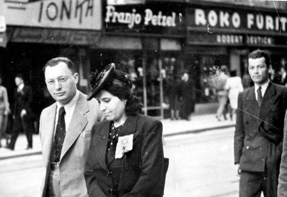Events
The Vienna Wiesenthal Institute for Holocaust Studies (VWI) organises academic events in order to provide the broader public as well as an expert audience with regular insights into the most recent research results in the fields of Holocaust, genocide, and racism research. These events, some of which extend beyond academia in the stricter sense, take on different formats ranging from small lectures to the larger Simon Wiesenthal Lectures and from workshops addressing an expert audience to larger international conferences and the Simon Wiesenthal Conferences. This reflects the institute’s wide range of activities.
The range of events further extends to the presentation of selected new publications on the institute’s topics of interest, interventions in the public space, the film series VWI Visuals, and the fellows’ expert colloquia.
| VWI invites/goes to... | |||
| Rory Yeomans: Victims, Beneficiaries, Consumers. Social Mobility, the Holocaust and the Economics of Human Destruction in Croatia, 1941-1942 | |||
Thursday, 10. December 2015, 16:00 - 17:30 Institute for Human Sciences 1090 Wien, Spittellauer Lände 3
|
|||
VWI goes to the IWM
Comments by Ljiljana Radonić
Rory Yeomans is currently a Research Fellow at the VWI. He gained his PhD from University College London. He is the author of Visions of Annihilation: the Ustasha Regime and the Cultural Politics of Fascism and editor of The Utopia of Terror: Life and Death in Wartime Croatia. He has been an advanced academia fellow at the Centre for Advanced Study, Bulgaria and a Cantemir fellow at the University of Oxford. His main research interests are the social, economic and cultural history of fascist Croatia.
Ljiljana Radonić is writing her postdoctoral thesis on World War II in Post-Communist Memorial Museums at the Austrian Academy of Sciences. Her PhD on War on Memory. Croatian Politics of the Past between Revisionism and European Standards was published in 2010.
In cooperation with:
|
|||










 What impact did the Holocaust have on everyday life, consumer culture and economic interactions? How did victims as well as ordinary consumers seek to negotiate their existences during the Holocaust? To what extent does genocide generate its own “moral economy”? This presentation seeks to answer these broader questions with reference to the Holocaust and the economic destruction of the Serbs and Jews in the Independent State of Croatia (Nezavisna Država Hrvatska – NDH). In the ten months between April 1941 and February 1942, Croatia under the leadership of the fascist Ustasha movement reshaped the patterns of everyday life and consumption in order to render life for Serbs and Jews unsustainable and construct a racially-purified economy. In the first few months of the state’s existence, Serbs and Jews were removed from the economic life of the nation. In the cities and towns of the new state, the impacts of the purification of economic life were being felt not just by the victims, but also workers, consumers, commissioners of fac-tories and businesses and ordinary citizens in every aspect of everyday life. These changes were exacer-bated by another aspect of economic terror: the attempt to construct an “ethical marketplace” which would be not only racially pure but also free of the harmful practices and economic “pathologies” which had character-ised Serbian and Jewish “control” of the national economy in the 1920s and 1930s. Drawing on the thousands of petitions, letters and diaries written by victims, the internal memos and field reports of low-level and regional bureaucrats charged with implementing the “Aryanisation” of the national economy and the correspondence between ordinary consumers, aspiring beneficiaries and economic agencies, this study aims to build a picture of what it was like to experience terror in real time.
What impact did the Holocaust have on everyday life, consumer culture and economic interactions? How did victims as well as ordinary consumers seek to negotiate their existences during the Holocaust? To what extent does genocide generate its own “moral economy”? This presentation seeks to answer these broader questions with reference to the Holocaust and the economic destruction of the Serbs and Jews in the Independent State of Croatia (Nezavisna Država Hrvatska – NDH). In the ten months between April 1941 and February 1942, Croatia under the leadership of the fascist Ustasha movement reshaped the patterns of everyday life and consumption in order to render life for Serbs and Jews unsustainable and construct a racially-purified economy. In the first few months of the state’s existence, Serbs and Jews were removed from the economic life of the nation. In the cities and towns of the new state, the impacts of the purification of economic life were being felt not just by the victims, but also workers, consumers, commissioners of fac-tories and businesses and ordinary citizens in every aspect of everyday life. These changes were exacer-bated by another aspect of economic terror: the attempt to construct an “ethical marketplace” which would be not only racially pure but also free of the harmful practices and economic “pathologies” which had character-ised Serbian and Jewish “control” of the national economy in the 1920s and 1930s. Drawing on the thousands of petitions, letters and diaries written by victims, the internal memos and field reports of low-level and regional bureaucrats charged with implementing the “Aryanisation” of the national economy and the correspondence between ordinary consumers, aspiring beneficiaries and economic agencies, this study aims to build a picture of what it was like to experience terror in real time.
